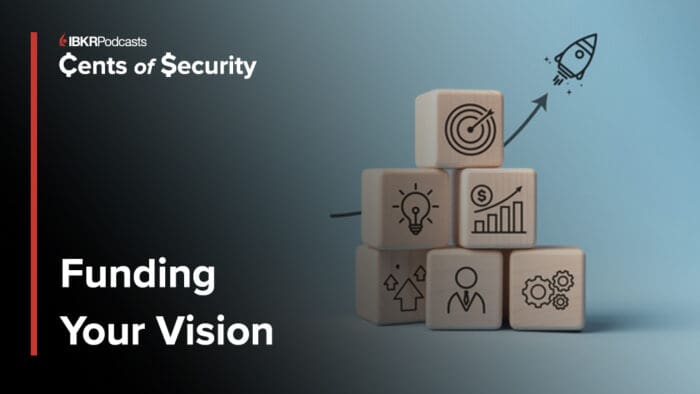Starting a business can be fun and exciting, but the financial aspects can seem daunting. There are so many things to establish and keep track of. Elizabeth Ayoola, Personal Finance Expert at NerdWallet joins us for this episode to discuss. We explore some best practices to keeping your start-up business on track financially and key performance indicators to stay well-informed about.
Summary – Cents of Security Podcasts Ep. 75
The following is a summary of a live audio recording and may contain errors in spelling or grammar. Although IBKR has edited for clarity no material changes have been made.
Cassidy Clement:
Welcome back to the Cents of Security Podcast. I’m Cassidy Clement, Senior Manager of SEO and Content at Interactive Brokers. And today I’m your host for our podcast. Our guest is Elizabeth Ayoola, NerdWallet’s personal finance expert. Starting a business can be fun and exciting, but the financial aspects can seem daunting. There are so many things to establish and to keep track of. In this episode, we’ll explore some of the best practices to keeping your startup business on track financially and key performance indicators to stay well informed about. Welcome back to the show, Elizabeth.
Elizabeth Ayoola:
It’s always a pleasure to be here.
Cassidy Clement:
So let’s just dive right in here. You know, the biggest deal, I guess you could say for the past, I want to say almost a decade business reality television, if you will, something like Shark Tank, people are so enamored with it. They love the idea of a startup. It’s also obviously a huge buzzword when it comes to, finance and the business world and banking. But just to go in here, you know, what exactly constitutes a business as a startup? Before we dive into the more important stuff.
Elizabeth Ayoola:
Yeah, it can seem like gray area, right? So, to dive into that, any business that’s in the incipient stages of operations can essentially be classified as a startup. So, startups usually have an end goal of establishing a repeatable and also a scalable business model, and they want to do that as quickly as possible, and they’re trying to make a dent in their industry. Another way to describe the difference is that startups are more focused on rapid, robust growth and want to go from startup to company as quickly as possible, but that may not be the case for small businesses.
Cassidy Clement:
Yeah. And those startups, it’s important to, realize for our listeners, you know, some of the ways that they may be funded, it’s not that it’s one size fits all. There’s a lot of different funding, whether it’s, you know, different types of investors or venture capital, or maybe it’s almost like an incubator type situation from another business.
There’s a lot of ways, but the financial ideas, when a brand new concept comes into play, a lot of the key metrics and documents people should have generally stay the same. And not to harp back onto the Shark Tank thing but if you ever watch an episode, there’s a lot of repetition in what they ask for from people that are on the show. And it’s usually different metrics and documents that a bank may also ask you for if you’re looking to establish a loan for your company. So to get into that aspect, when we’re looking at the financial metrics for your financials and your startup idea, or even if you are a startup currently, you know. What are some basic metrics and documents that someone should be aware of when starting their business or maybe starting out the business?
Elizabeth Ayoola:
Yeah, so that’s a good point. There are a few things that come to mind that people will need or may need, and that includes an EIN. Choosing the right business structure is something I think sometimes people don’t think about. Getting the right licenses, having a business bank account, and then also business credit cards. If you want, I can go into a bit of each for you, or we can move on if you feel it’s self-explanatory.
Cassidy Clement:
No, I think that’d be great. Let’s go right into that, I can riddle off some of the more accounting type documents that also could be helpful for the listeners because you kind of need one of those to establish the other.
Elizabeth Ayoola:
Absolutely, absolutely. So starting with an EIN, for anyone who doesn’t know, it’s essentially just a nine digit number that identifies a business for tax purposes. And also an important distinction to make is that it creates a separate entity in the IRS’s eyes between your business and yourself. So an EIN can help with opening business bank accounts, it can also help when applying for licenses, and also when you’re filing your tax returns.
Now, for anybody, you know, who’s listening, who is thinking about starting a startup, it’s also usually necessary if you plan to hire employees and set up payroll in the future. So at NerdWallet, we suggest that every business get an EIN, unless you happen to be a side hustler and you don’t have any plans of expanding or growing your business.
Now, in terms of business registration and structure, this is a really important one because the legal structure of your business can essentially affect everything from your taxes to what you’re liable for, and both of these things impact your finances as well, right? So common business structures, as some of us may know, is a sole proprietorship, a partnership, an LLC, a C Corp and S Corp. But I will highlight that many startups tend to start as a C Corp or rather establish their business structure as a C Corp because it has the strongest protection. So if you think of a business like Google for example, they are usually structured as a C Corp, right? So yeah, those are some things to be aware of in terms of your business structure.
For anyone who’s wondering, like, how do I choose which business structure to go for? It’s a good idea to educate yourself by reading through each. It’s a bit long to go through each on this episode, but we do have resources on NerdWallet and seeing which best aligns with your long term goal and also how much risk you’re willing to take, right?
For licenses and permits, that’s pretty self explanatory, and that’s going to vary depending on the industry that you’re in, but you want to do research and make sure you have the right licenses and permits to run your business so that you can avoid running into trouble. Now, as somebody who is, you know, a one man business owner, business bank accounts and business credit cards are two of my favorite things to talk about in terms of things that you need because it really, really helps you separate, again, your personal finances from your business finances. And this can be critical because you want to avoid something called commingling, which is when you mix both your personal and your business finances. And as a business, if you ever get audited by the IRS and you are found commingling, this could nullify any liability protection that you have if you’re an LLC, S Corp, C Corp, and basically leave you pretty vulnerable.
Cassidy Clement:
Yeah, and I mean, those pieces that you mentioned, they’re very important to think about before you’re launching and making sure that you have all of your ducks in a row. Now, upon launch, there’s obviously going to be different things that you want to be aware of, whether it’s to secure more financing, to grow your business, to understand structure and your model. We actually did a podcast recently on intro to business models, which is kind of the same thing. You know, how are you making your money? What are your profit streams? Are you subscription based? Are you service based? Are you a franchise? What’s the style here? But really it’s important to make sure that you have a good grip on, you know, what’s your profits and loss, your balance sheet? Do you have a tax return yet?
Which kind of goes into the EIN scenario. Do you have any reports that at this point are kind of out of order, they’re too old, you know? Can you answer quickly, like net income, what your capital is? Do you have a profit margin? Quick type of items that are really important in those early stages, because as you mentioned, if you do end up making the mistake of commingling any of the finances, it’s incredibly crucial to understand those key metrics, because now you’ve got to figure out how to pull that out to separate it.
Especially if you’re going to grow, it’s a lot harder going into that after the fact then, slowly but surely adding bits and pieces. So You mentioned that, that whole idea of, okay, if you’re going to go into launch, you may think, okay, it’s my startup as my side hustle. But if you do at any time feel like this is a long haul, you know, you want to make sure that, you keep the finances on track for the business that you are starting up. So what are some best practices that you can think of, startups may not think of, or maybe just it’s a good thing to keep in mind when they’re starting to operate, or even right before they start to operate?
Elizabeth Ayoola:
I will say, especially as a small business owner, bookkeeping is essential. So I know this is probably not revolutionary, but it is something that is so easy to lose track of. And I know when I first started my small business, I was commingling. I did not have any bookkeeping system in place and what would happen is tax season will come and I’d be scrambling trying to, you know decipher which was a business expense, which was a personal expense, what did I even spend money on?
So it’s important to have a bookkeeping system in place. I do understand as a new business, a startup, small business, whatever it is, you may not have the finances to hire someone, but, an alternative could be to hire a virtual bookkeeper if you can afford that. And if you can’t the good thing is that there are software systems out there that you can use or counting software systems, that are both free and ones that you can pay for that can help you to stay organized. As I mentioned earlier, it’s extremely important to separate your business and your personal finances and the simplest way to do that is through a business bank account and even a credit card or a debit card to help you to separate those.
So now that I have done that, I can easily see all of my expenses because I, you know, make sure not to basically commingle and I can see what I spent throughout the year. It’s also extremely important for people to understand their tax liabilities, again, and certain software can help you keep track of this as well. But some people do not budget, you know, for their taxes, and what happens is they get hit with a huge tax bill, and this could lead to penalties by the IRS if you underpay as well. So something I had to also get on board with doing is paying estimated taxes, and what that is, is you essentially pay a certain amount of taxes each quarter, and you’re estimating what you think you might earn. So this way you can stay away from Uncle Sam’s radar when it comes to penalties and fees and things like that.
Cassidy Clement:
Yeah, totally. I mean, in my research, some of the things that people, may tend to forget, at least in the stages, ’cause it is exciting. You know, you’re starting a business and you’re getting out there and you’re trying to explain all the pros. But you know, you don’t want to lose sight of those financial goals. The estimating of your expenses is huge. Budgeting is even bigger, if not very similar. You know, you want to make sure that you’re able to limit the expenses early on because you don’t want to overshoot it. You want to make sure that those revenue targets are actually, you know, going to potentially or are being hit. Especially when it comes to budgeting if you have to on the side for what your tax bill may become. Cause that cash flow can start to shrink a little bit once you start to factor in some of those other pieces.
So some things that people may not have thought of when it comes to the financial items or pieces or documents or conversations even that go into a startup. What are some of those things that you can think of? In my research and at least in my experience I had, you know, companies will start out or maybe they’re small like you said, we’ll designate them small business in a hypothetical, and they may need to explain how they’re going to adapt their financial model because the business scale that they thought was going to happen is not happening, or the business landscape is changing. One of the biggest things that people tend to forget is how do you present your financials if you didn’t make a profit or you have no revenue yet? It is major.
You can have the greatest idea ever. You could be in an incubator. You could have the most, the greatest investors, or you can have no investors, but you have a great idea. If you don’t have some idea of presenting those financials and what you need before you even have that first dollar, you know, it’s so important. And of course, finally, at least this is just my little list, the power and the help that networking can offer you as a small business. I hate to sound like, you know, the person on the street at the holidays ringing the bell, but it’s like, you know, any bit helps if you can go to any networking event or any small business or commerce area and talk to people in the space or connect, you know, it’s really powerful and it’s so helpful for your business as it starts to grow. I mean, from your perspective, as the personal finance expert, you know, what are some things that people may not have thought of initially?
Elizabeth Ayoola:
I think something people may want to explore more, I know when I first started my business as well, I thought the only funding options were myself or a personal loan, right? And then there’s that conundrum if you don’t have business credit, well, how do I take out a business loan? So I think it’s important for people to explore funding options.
And there are so many different ones out there, there are FBA microloans and those specifically cater to startups. So they can provide up to $50,000 of working capital that can go towards inventory, supplies, furniture, fixtures, machinery, and equipment as well. Also there are grants, there are so many grants, especially if you happen to be in some kind of a niche. So maybe if you’re a woman, veteran, you’re a minority or just, there’s so many different niches for grants out there as well that you can find on government agencies, state organizations, as well as in private corporations, you can find those grants as well.
Yes, I would say that and then also trademarking is one that people should think about as well. So not everyone necessarily needs to trademark, but as a startup, if, as we said, you’re thinking about, you know, big rapid growth, then trademarking may be something that you want to think of. So you can trademark a name, a phrase, a logo, or a symbol. And not trademarking if you’re wondering, well, should or shouldn’t I? It could lead to someone, you know, copying your idea, or it could lead to you being sued if someone feels like your idea is too similar to them. So these are protections that you also want to have in place as, a business owner.
Cassidy Clement:
Yeah, totally. I mean something else that I think, we didn’t totally touch on, but we can briefly because it could be its own podcast in and of itself. But if you are a small business or a startup that is investor based and you did raise a significant amount of money, you may want to look into something that some vehicle where you can invest that that money can gain interest before it immediately goes back into the business. Whether it’s, you know, something that’s high yield or et cetera. You don’t have to spend everything immediately and always because you don’t want to burn your cash flow. So if you do have, you know, the opportunity where you’re able to stagger some of the investment, you know, there’s a chance that, oh, maybe there’s something high interest or something like that to help out.
Elizabeth Ayoola:
Absolutely, what you said is spot on and this is why it’s so important. I think sometimes business owners, startup owners just have this idea that they have to do everything and figure everything out on their own. And it’s so important as you go along, especially if you are lucky enough to have those funds to build an efficient team of people who can help you with those legs. So you’re not necessarily expected to know, as a startup owner, as you mentioned, what you should invest in or exactly how to manage the money. But what you do want to avoid is the mismanagement of funds. So this would be a great time to speak to a financial advisor, to hire a CPA, or a team of financial professionals who can tell you different options of what you can do with that money. Because as we mentioned earlier, one of the main points of a startup is to scale and is to have that exponential growth, and it’s difficult to do that if you’re not managing your finances properly and you’re burning through all your cash. So that would be a great time to get a financial advisor, to give you advice about what to invest in, where to house your money, or even just where to spend that money, that’s going to lead to growth for your startup or your business.
Cassidy Clement:
Yeah, absolutely. I mean, it’s so important to remember what matters, financially for a scaling business rather than, comparing yourself to something that’s a little bit more of a, established behemoth, if you will. Because everyone has super high in the sky dreams, which is great. Love it. But the reality is there’s a lot of in the trenches, if you will, before you get there. So you have to make sure that, you know, you don’t run into the inaccurate projections or you have issues with your books or things like that cause it can lead to a much more bumpy road than you necessarily need. You hit the nail on the head, if there is a resource out there for you, whether it’s via networking or if you do find an accountant or something like that, that fits your needs, you don’t have to go at it alone and, you know, you could still reach full potential with a little bit of help. So I think it’s important. Yeah. Well, thanks so much for joining us today, Elizabeth.
Elizabeth Ayoola:
Thank you for having me. And I hope this helps someone who’s trying to start a business or already has.
Cassidy Clement:
Yeah, awesome. Thanks. So as always listeners can learn more about an array of financial topics for free at the IBKR Campus. Follow us on your favorite podcast network and feel free to leave us a rating or review. Thanks for listening everyone.
Disclosure: Interactive Brokers
The analysis in this material is provided for information only and is not and should not be construed as an offer to sell or the solicitation of an offer to buy any security. To the extent that this material discusses general market activity, industry or sector trends or other broad-based economic or political conditions, it should not be construed as research or investment advice. To the extent that it includes references to specific securities, commodities, currencies, or other instruments, those references do not constitute a recommendation by IBKR to buy, sell or hold such investments. This material does not and is not intended to take into account the particular financial conditions, investment objectives or requirements of individual customers. Before acting on this material, you should consider whether it is suitable for your particular circumstances and, as necessary, seek professional advice.
The views and opinions expressed herein are those of the author and do not necessarily reflect the views of Interactive Brokers, its affiliates, or its employees.
















Join The Conversation
For specific platform feedback and suggestions, please submit it directly to our team using these instructions.
If you have an account-specific question or concern, please reach out to Client Services.
We encourage you to look through our FAQs before posting. Your question may already be covered!